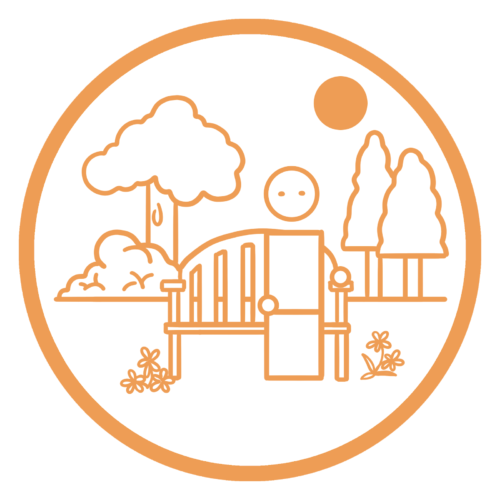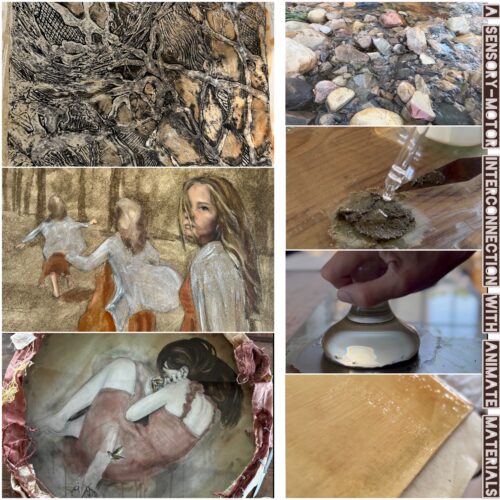
OCA wellbeing: Gardening for mental health
After last weeks post about wellness toolkits, Barbara has shared her experiences in the garden, below.
Only a few short weeks ago, I would never have suggested being the one to write this blog post. Although I’m lucky enough to have a garden, it was sorely neglected. Lack of time and (let’s be honest) inclination meant the plot was messy, overgrown and not a relaxing place at all.
Lockdown in mid-March prompted two responses. First was a recognition that getting outside for parts of the day without bumping into other humans would become a very valuable thing. Second, I had some new time, that used to be spent travelling and trolling the train companies about their poor service, and I could put this to good use by sorting out my embarrassing back garden.
I started this with a view to having ‘something to show’ at the end of the crisis and I started blogging about it to make sure I kept going. I couldn’t predict the positive effect those hours weeding and planting have had on my mood. I look forward to even half an hour there every day and the excitement I feel at producing, say, a radish or any healthy set of seedlings is surely disproportionate.
I also noted that I was not alone, in the sense that half the UK appears to have taken up gardening since lockdown. Why?
You might expect organisations like the Royal Horticultural Society to claim that gardening is good for our wellbeing. But there’s a real science behind it.
Let’s start with the obvious benefits: exercise, fresh air and Vitamin D, of which many of us are a bit deficient. Research has shown that what some people call ‘forest bathing’ – aka, a walk in the woods – has the effect of boosting our immune system and reducing hormones like cortisol which are a response to stress. Time spent in nature has been shown to improve mood in people suffering from depression: Monty Don’s The Jewel Garden (2004) tells how gardening brought him back from a severe depression following a business failure.
Given all this, it’s not surprising that connecting with nature helps us to be more creative. Monet famously said his garden was his most beautiful masterpiece. (Can’t travel? Check out Monet’s garden here).
In her book The Well Gardened Mind (2020), Sue Stuart-Smith offers a number of case studies detailing how gardening has helped people recover from the most severe forms of trauma and stress. She suggests it may be because gardening is a nurturing thing to do, teaching us patience and the need to give up control.
I’m famously bad at waiting for anything, so gardening has been a great lesson for me (although I am still swearing under my breath on a daily basis because my neighbour’s peony is in full bloom and mine is stubbornly still in bud).
The good news is that you don’t even need a garden: houseplants can also have a beneficial effect on your mental health and even help you breathe that bit better. Planting a pot of basil on your kitchen windowsill may do more than enhance your next bowl of pasta. As can noticing the trees and green patches on a daily walk.
Have you been gardening in lockdown? Has it helped? Send us your images and look out for more ideas over the coming weeks!
|
|







Thanks for the post – heard Claudia Hammond discussing her book The Art of Rest a few times – and her preferred behaviour was to garden (unfortunately it didn’t make the top 10 as featured in the book). She talks of prescribing herself 15 minutes a day to potter in the garden. The benefit of the time spent far outweighs the time lost by doing the gardening for her.
If 15 minutes is too much, then wondrous Laetitia Maklouf has written The 5 Minute Garden and is well worth a follow to receive her newsletter.
Off out now to deadhead some roses ….
Thanks Andrea – will definitely check that out!
Thank you Barbara. Most of my gardening time is taken up with an allotment and the pleasure of growing – and eating – produce. Hence our garden often looks quite neglected and scruffy but is a haven for the insects, birds and mammals that visit. This in turn brings us joy and gratitude, particularly at the moment.
For those not fortunate or able to be outdoors, this season of “Springwatch” on the BBC is very much focused on the positive impact of nature on wellbeing. Even short clips of 90 seconds of the sights and sounds of nature are beneficial.
That sounds lovely. Certainly the wildlife is an important part of our garden too!
this is very informative and intersting, thanks 🙂
I really needed this! Thank you
Thanks Sophie! I’m looking forward to getting out there again soon when the weather improves.